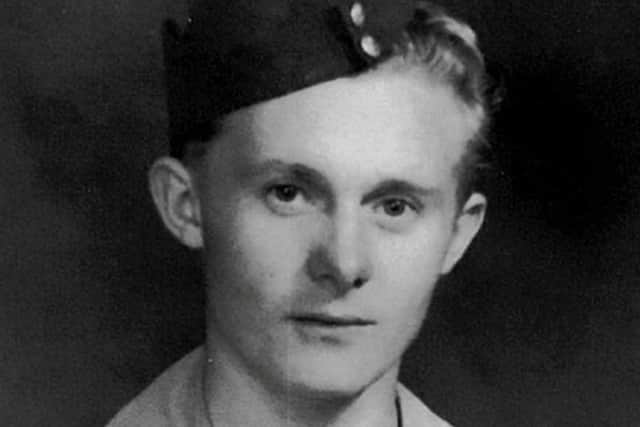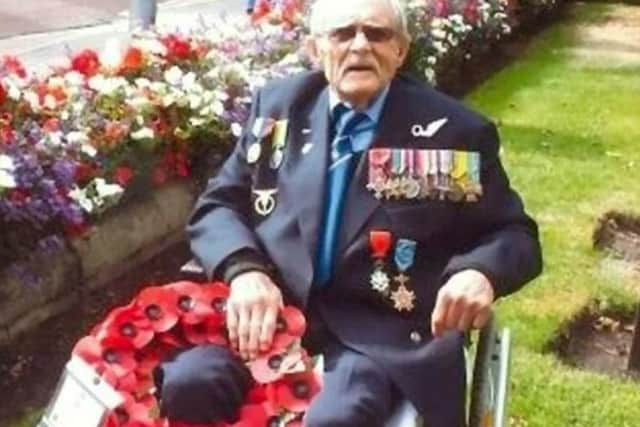Appeal for public to attend funeral of war hero, 95, who had no family
Bomb aimer Jim Auton, MBE, risked his life twice to carry out low-level drops of supplies during the 1944 Warsaw Uprising.
The 68-day revolt against Nazi occupation cost the lives of 18,000 Polish fighters and 180,000 civilians.
Advertisement
Hide AdAdvertisement
Hide Ad

The World War Two veteran was awarded 19 medals for bravery and valour making him one of Britain's most decorated servicemen of the conflict.
Mr Auton, who lived in Newark, Nottinghamshire, died last month with only his carer Paul Trickett by his side.
His wife Peggy passed away in 2016 and he had no children, leading friends to fear his funeral would be poorly attended.
But RAF top brass launched an appeal to boost the number of mourners by organising a fitting flypast when he is laid to rest tomorrow.


Mr Trickett said: "It would be a great shame if one of our nation's last surviving and most highly decorated Second World War heroes didn't get a send-off befitting of him.
"Hopefully, we can enlist the support of our local population."
Mr Auton grew up on RAF bases as his father was a member of the ground crew who maintained some of the force's earliest aircraft.
He joined up in 1941, having seen the devastation poured on British cities caused by the Luftwaffe, and hoped to do his bit.
Advertisement
Hide AdAdvertisement
Hide AdInitially, he wanted to be a Spitfire pilot but was later re-trained as a bomb aimer.
He flew 37 wartime missions with the 178 Squadron but is best known for his contribution and bravery during the Warsaw Uprising.
On August 1, 1944, after five years of Nazi rule, the resistance groups in the city rebelled in an effort to overthrow their oppressors.
Within the next few days, around 180,000 Polish civilians were killed, including an estimated 60,000 children, with supplies running low.
Winston Churchill sent over 200 low-level RAF supply drops to the besieged city in an operation known as the Warsaw Airlift.
On August 12, 1944, Mr Auton and his crew flew to Warsaw to drop 12 containers with essential weapons, ammunition and medical supplies.
During a six-hour flight to the beleaguered city, he witnessed one of their aircraft shot down before they found the drop zone.
His crew all agreed they would not return home until the Armia Krajowa (Home Army) soldiers received their supplies.
Advertisement
Hide AdAdvertisement
Hide AdSpeaking previously about the operation, Mr Auton, who wrote a book about liberating the Eastern Front, said: "We must have been mad. Planes were being shot down all around us.
"I said we had not come all this way to drop the supplies in the wrong place. You just felt like a robot and the training took over."
Two nights later, he and his crew would return to drop further supplies.
On his 37th military mission, Mr Auton was seriously wounded, suffering damage to his lungs and he lost an eye.
After the war, he became fluent in six languages and was even asked to spy for British intelligence, but refused.
He was called a "true friend of Poland" in a letter signed by that country's ambassador in October last year for his role in liberating the country.
Mr Auton received thousands of messages of thanks and support from people in Poland, who recognised his outstanding service during the conflict.
Arkady Rzegocki, Polish Ambassador to the UK, said in the letter: "With the 80th anniversary of the outbreak of the Second World War, I am all the more grateful that we can celebrate deeds of individuals such as yourself.
Advertisement
Hide AdAdvertisement
Hide Ad"You did not back away when your fellow human beings were in need.
"You are an example to follow for future generations."
He was also awarded the Order of Merit of the Republic of Poland by President Andrzej Duda, which is the highest award a foreigner can receive.
For his wartime bravery, he received 19 medals from countries including France, Poland and Czechoslovakia.
He was also bestowed an MBE from Prince Charles for his charity work, which included raising £3m for the Air Bridge Association, which he also founded.
In 1989, he was responsible for the creation of the Warsaw Air Bridge Memorial in Newark Cemetery.
The memorial cross was erected to commemorate both the Armia Krajowa and the 250 British, Polish and South African airmen who died in supporting the uprising in Poland.
His wife, Peggy, is buried by the cross and he has a plot next to her at Newark Parish Church.
